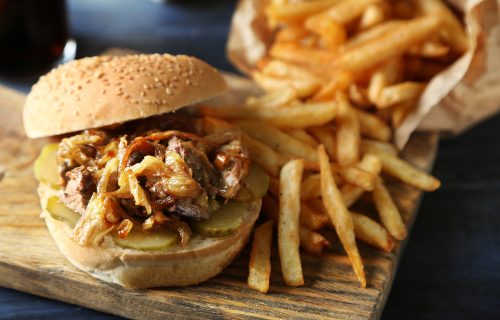
How to Lose Weight Without Dieting
More people today struggle more than ever before with their weight. So it isn’t surprising that most people want to know how to lose weight without dieting.
On an elementary level, there are a few ways you can lose weight effectively.
All of them have to do with calories in – or the foods and drinks you consume – and your calories out – or the fat cells/energy your body uses to function.
BMR – Basal Metabolic Rate
Everyone has a Basal Metabolic Rate or BMR. Your BMR is the number of calories you need to keep your body running at rest.
Factors including gender predisposition, age, height, and typical activity levels impact the total number of calories you need to consume in a day to support basic survival.
Typically, active and younger people tend to have higher BMR requirements than older people and people with sedentary lifestyles.
The more activity you do daily, the more calories you’ll need to support your energy levels.
When you eat more calories than your body needs to complete essential bodily functions, there’s a greater chance of weight gain.
Exercise and counting calories can help ensure that you don’t exceed the recommended number of calories you should eat in a day; and permanent, sustainable weight loss comes from creating a deficit of calories by eating fewer calories or burning them off through direct exercise.
On the most elementary level, it sounds like a simple concept. But in reality, losing weight safely and permanently is often more complicated.
Every calorie you intake in a day matters. That’s why you can’t overlook sneaky calories, such as those found in full-sugar versions of colas, fruit juices, sweetened iced coffees, or the chips you ate as a late afternoon snack.
When you overshoot your calorie count for the day, these extra calories get stored as fat cells due to human physiology. In the early days, this physiology helped humankind survive by creating fat stores for lean times.
In today’s modern society, the need to store fat for survival or lean times isn’t as critical. A general abundance of food choices and sources means most people don’t have to worry about famine.
Changing Habits for Weight Loss
The word “diet” is often loaded. Many people who hear it or say it instantly associate bland foods, dietary restrictions, salads, and maybe even a guilty feeling because “they’ve been down that road before.”
If you’ve struggled to lose weight in the past, it can be easy to feel jaded or uninspired with a new plan that promises the world but doesn’t deliver.
The key to launching and maintaining a successful weight management and health campaign is changing your habits and leading a healthier lifestyle. For many people, Hypnotherapy Melbourne helps release old and outmoded thoughts.
It can prove especially helpful when combined with a program that includes exercise, healthy eating habits, and the oversight of your primary care provider.
The hypnotherapist will use the power of suggestion to put you in a more relaxed and receptive state of mind. When the conditions are right, they will use mental imagery and verbal repetition to guide the session.
When under hypnosis, your mind is more receptive to messaging and suggestions, including those that promote behavioural changes for sustainable weight management.
In other words, hypnotherapy can address several issues commonly associated with carrying extra weight.
Visualization
Visualization is a potent exercise in changing your thinking patterns. Nearly everyone at some point in their life has said, “I want (or need) to lose a some weight.”
When using visualization for weight loss, instead of making a statement about how you want to lose 10 kilos or build your strength, you envision yourself as you’d like to be.
Other non-hypnosis related ways to use visualization to realize goals include creating a vision board with inspirational images and sayings that help keep you inspired and motivated to achieve your goals.
Changing Views Towards Food
Losing weight can be particularly tough because you can’t just stop eating one day. Unlike other unhealthy habits like smoking or drinking. You have to eat to live.
To instil a different attitude towards food, the hypnotist will use the power of suggestion to imprint the unconscious mind to overcome unhealthy eating habits. Examples of some of the affirmative statements the hypnotherapist might use could include:
“I respect my body, and I choose foods that support my health and wellness.”
“I have the ability to make healthy choices in what I eat and drink.”
“I make small changes everyday to meet my weight loss/health goals.”
“I embrace a healthy lifestyle.”
“I’m motivated to meet my health/weight loss goals.”
“I only eat as much food as I need.”
“I choose foods that provide my body with nutrients.”
“I control my appetite. My appetite doesn’t control me.”
“I eat vibrant foods that make me look and feel better.”
“I feed my body what it needs to thrive.”
“I drink more than enough water to stay hydrated.”
If you like the idea of doing affirmations, this affirmations video I created will help you focus on your ultimate goals.
By listening and absorbing affirmations in a hypnotic state, my clients are able to control food compulsions and replace less healthy eating habits with healthier ones.
Increasing Energy Levels
Lethargy, fatigue, and tiredness is standard among people these days. People with a significant amount of weight to lose, lessened mobility, and lower energy levels can present another obstacle to achieving weight loss, fitness, or health goals.
During the hypnotic experience, statements the therapist might use include:
“I have the strength and energy to accomplish what I need to today.”
“I feel vibrant and strong!”
“Every day I wake up with more energy than I did yesterday.”
“I am becoming healthier and happier with every day.”
“My energy is boundless!”
“My body is a finely-tuned machine, ready to go at a moments notice.”
“I am grateful to have a powerful, energetic, and healthy body.”
Statistics Tell the Cold Hard Truth
According to sources, 80% of adults in Australia are chronically dehydrated.
And statistics from the Australian Institute of Health and Welfare indicate that 67% of Australian adults are overweight or obese.
These two statistics indicate that people aren’t drinking nearly enough water, and their lifestyle habits include eating more calories than they need to support their basal metabolic rate.
One small modification people can make to address both of these problems is drinking a large glass of water when a hunger pang strikes. Your body is often crying for water, but the message gets misinterpreted as hunger.
Water is a zero-calorie drink that every cell in your body depends on to function. It makes up 90% of your blood cells and 73% of the brain.
Not consuming enough water is dangerous to your overall good health. (If you don’t particularly enjoy the taste of plain water, consider infusing it with fruits, herbs, or vegetables. It’s perfect for adding a hint of flavour and some extra minerals and nutrients into your diet!)
If you decide you still feel hungry twenty minutes after drinking a glass of water, make a wise dietary choice that supports your goals.
As you might imagine, this technique alone can potentially cut thousands of calories from your daily intake. Also, you might consider replacing high-sugar drinks or caffeinated drinks with regular or infused water.
Consistency Matters When Changing Your Patterns
According to many experts, it takes as little as three weeks for new behaviours to become a habit.
When it comes to losing weight, making little changes can have significant impacts.
As we talked about above, skipping or replacing a high-calorie snack with a low-calorie glass of water done over and over makes a difference. Not only a difference in your waistline but also your hydration levels. Both of which are beneficial!
Working with a local hypnotherapist can prove helpful in forming new rituals that support your health and wellbeing.
When your mind is in a receptive or hypnotized state, the positive and affirmative messaging imprints your subconscious with new uplifting thoughts and patterns.
Much the same way that drinking more water can lead to better hydration levels, feeding your mind with positive and forward-thinking statements helps overcome negative patterns that once existed.
It’s unrealistic and unfair to you to expect to see massive results overnight. The chances are good that it took quite some time to accumulate the extra weight you want to lose – maybe even years.
However, the sooner you put your intentions towards modifying your unhealthy habits, the closer you become to your goal. If you use this opportunity wisely, it helps put you on the path to better health and wellness for the rest of your life.
The best way to learn how to lose weight without dieting is by changing the way you think about food, yourself, and your relationship with food.



